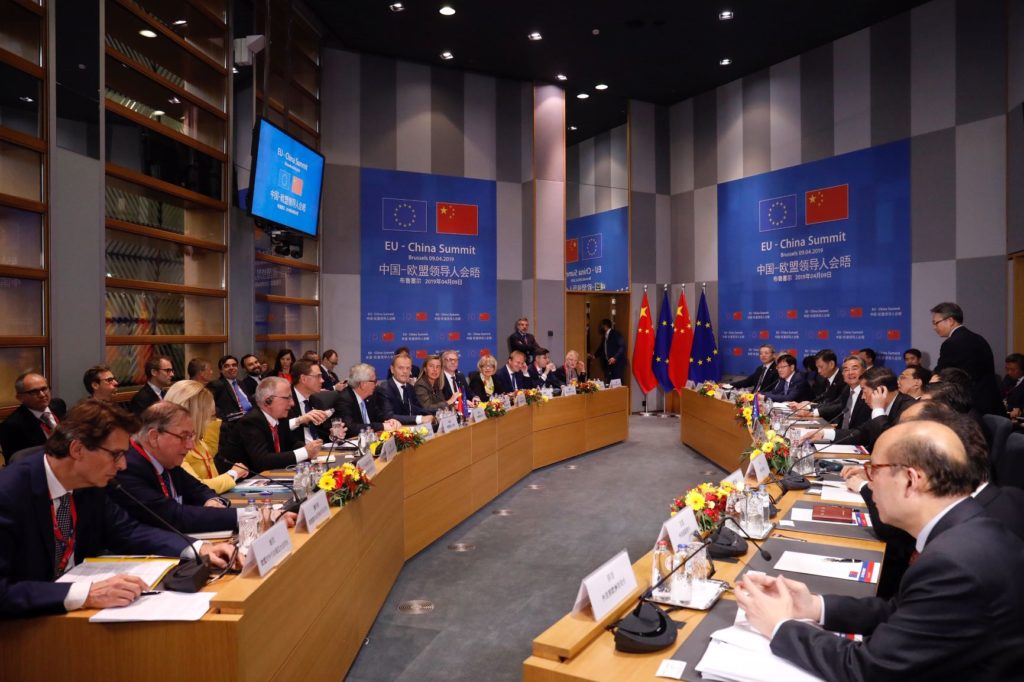The EU-China leaders' meeting via videoconference on Monday (14 September) will focus on EU-China bilateral relations, including on climate change, economic and trade issues. The meeting follows a previous summit in June.
The EU will be represented by European Council President Charles Michel and European Commission President Ursula von der Leyen, with German Chancellor Angela Merkel for the Council Presidency. President Xi Jinping will represent China. The EU High Representative Josep Borrell will also participate.
A background brief published by the European Council on Friday says that the leaders are also expected to discuss international and other issues of concern and exchange views on responses to the COVID-19 pandemic.
The brief states that he EU and China are committed to a comprehensive strategic partnership, as expressed in the EU-China 2020 Strategic Agenda for Cooperation. It refers to the EU’s Strategy on China, adopted in July 2016, and a strategic outlook of the EU-China relationship by the European Commission and the High Representative in March 2019.
According to the brief, the EU-China High Level Trade and Economic Dialogue in July has resulted in some progress on the Comprehensive Investment Agreement (CAI). EU aims at accelerating and concluding the negotiations on an ambitious agreement by the end of the year.
EU’s strategic documents, however, might be partly outdated according to a review by the European Court of Auditors (ECA) last week on “The EU’s response to China´s state-driven investment strategy”.
The review was initiated by ECA in September last year and completed before the outbreak of the pandemic. It does not require a reply from the Commission but is similar to an audit when it comes to data collection and analysis of publicly available information. The focus in the report is on EU’s strategy but it could as well be read by China, its strategic partner but also competitor.
In the review, ECA looks at the multiple risks – mainly of an economic and political nature – China’s state-driven investment strategy poses to the EU, as well as the opportunities it presents. The risks appear for the moment mostly theoretical but could have a negative impact on reciprocity and the existence of a level playing field if they would materialise.
The EU is China’s biggest trading partner, while China is the EU’s second largest. The EU is the world’s leading destination of foreign direct investments but China’s share of them is still relatively small. According ECAs review of Eurostat statistics, China’s share of total foreign investments in EU was only 3 % in 2018. Judging from the examples in the review, the investments have been beneficial.
The auditors raise the challenges EU is facing in managing its response, including how to better set, implement and track its own strategy on China and coordinate the actions of EU institutions and individual member states as regards their bilateral relations with China. A main problem is the lack of reliable data on China’s investments in the EU.
“China has risen as a significant economic player internationally and EU-China relations will affect the lives and economy of EU citizens for years to come,” said Annemie Turtelboom, the ECA Member responsible for the review. “An effective response to the geopolitical shift would require the EU to step up its strategy on China, and member states to act together with the EU institutions as a Union.”
The auditors write that member states cooperate with China bilaterally according to their own national interests and without informing the Commission even when there is a requirement to do so. An example highlighted in the review is that fifteen member states have individually signed non-binding Memorandums of Understanding (MoUs) with China to cooperate on the Belt and Road Initiative.
“We aren’t judging the MoUs politically,” the ECA member said at a virtual press conference, “but the Commission should have been informed about them.” The auditors did not request the memorandums from the member states concerned, mostly new member states in the enlargement rounds 2004 and 2007, and have not read them.
It was not clear from the briefing if the MoUs contradicted any EU positions and it seemed more as a matter of missing EU coordination. The audit team described the lack of reliable data as “a black hole” preventing the EU from making a comprehensive risk assessment.
“The EU is pursuing a realistic, assertive and multi-faceted approach to its relations with China,” commented Nabila Massrali, EU Spokesperson for Foreign Affairs and Security Policy. “We aim to ensure that our relations are set on a fair, balanced and mutually beneficial course, reflecting that China is simultaneously a cooperation partner, a negotiating partner, an economic competitor and a systemic rival.”
Asked about the Commission’s reaction to the ECA review, she replied that the review confirms the fact that, “China’s increasing international presence, of which state-driven investment is a key aspect, requires political attention.”
“The EU economy benefits from having one of the world's most open investment regimes. However, we are not naive, and are addressing concerns over reciprocity and the level playing field, both internally within the EU and directly with China,” she added. As regards the MoUs, “neither the EU nor any of its member states can effectively achieve their aims with China without full unity”.
M. Apelblat
The Brussels Times

